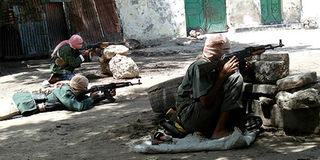One group opts for peace but fighting continues in Somalia

Somali Islamist fighters take their positions during clashes with government in Mogadishu. Photo/ REUTERS
What you need to know:
- Al-Shabaab militants take control of the strategic Jowhar, north of Mogadishu
MOGADISHU, Sunday
The fledgling Transitional Federal Government of Somalia had a sigh of relief today when a rebel group joined it.
Sheikh Yusuf Mohamed Siyad Indha’adde led a caravan of battle wagons (pick up trucks mounted with guns) and hundreds of militias in crossing over to the government side.
The former opponent of the government shifted loyalty and moved his military machines in the early hours at a school in north Mogadishu.
Sources in the city indicated that the rebel leader formally accepted the government proposal to join it.
The move was the culmination of the result of talks that have been going on for several days.
Before joining the reconciliation process, Sheikh Yusuf Indha’adde was the Defence officer of Xisbu Islaami (Islamic Party) controlled by Islamist leader and dreaded government opponent, Sheikh Hassan Dahir Aweys.
Sheikh Yusuf Indha’adde repeatedly stated that he would work with the government if the Sharia (Islamic) laws were adopted.
Therefore, the sheikh and his militias may have decided to join the government when President Sheikh Sharif Sheikh Ahmed signed the Sharia laws last Wednesday.
At a press conference in Mogadishu, Sheikh Yusuf Indha’adde stated that he was in no doubt that the current Somalia Government was building an Islamic state.
“Once the implementation of the sharia has been endorsed by the Cabinet, approved by the parliament and signed by the president, we had no choice but to support the government,” said the sheikh.
The strategic town
“Our action is in line with the directions of the Supreme Religious Council formed in Mogadishu in February this year,” he added.
Meanwhile, Al-Shabaab fighters have today captured the strategic town of Jowhar, 90km north of Mogadishu.
Jowhar is the town that hosted the Transitional Federal Government in 2005 when it failed to settle in Mogadishu when it moved its institutions at the end of Somali reconciliation conference in October 2004 in Nairobi, Kenya.
The forces that captured Jowhar town left Mogadishu and Balad town, 30km north of Mogadishu.
But, some clashes between the loyalists of the Union of the Islamic Courts, who are associated with the government, and the invading Al-Shabaab fighters, caused the deaths of four people.
As news of the advancing Al-Shabaab fighters spread, the local residents of the largely agricultural district panic, fearing for their lives.
School children were sent home and most businesses were hurriedly closed.
Some businesses reopened when the radical Islamist fighters overwhelmed the pro-government militias.
In Jowhar, inmates were freed when Al-Shabaab fighters reached the town.
It is not clear whether the Islamists let the prisoners loose, or the inmates broke the prison gates to secure their freedom.
In Mogadishu, two mortar shells landed in two positions in the south.
At the Police Academy where officers were to get their ranks, a shell hit a nearby school, killing one student and wounding 11 others.
President Ahmed was to attend the occasion at the Police Academy, but the visitwas apparently suspended following the incident.
No group has claimed responsibility for the mortar attacks, but the government usually blames the armed opposition for such occurrences.
The political situation in Somalia remains volatile due to clan ties being paramount to national ones.
The situation has been worsened by the increased factional fracturing that has its roots in the former President Siad Barre regime.
This lack of a functioning central government has persisted since the fall of Siad Barre nearly 20 years ago.




